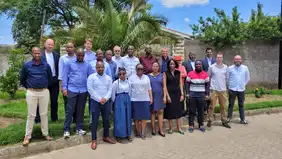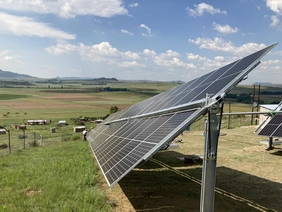During the last workshop in Maseru, Lesotho, experts from science, politics and industry discussed how PV-based mini-grids can accelerate and sustain rural electrification in Sub-Saharan Africa and what science can contribute. The overall project was funded by the German Research Foundation (DFG).
From 28 November to 2 December 2022, the project consortium consisting of scientists from the Institute for new Energy-Systems (InES), the National University of Lesotho, the Universidade Edudardo Mondlane from Maputo and the University of Bayreuth met in the capital of Lesotho to continue the intensive discussions of the previous workshops in Maputo and Ingolstadt and to further elaborate the joint research idea for a follow-up project. The workshop was supported by the participation of experts from the Department of Energy Lesotho (DoE), Lesotho Electricity Company (LEC), OnePower Lesotho, Smart Village Research Group, the LREEAP project of the World Bank and others. The focus was on the challenges and opportunities of rural electrification in Lesotho. World Bank data shows that Lesotho currently has an electrification rate of about 47 %, which particularly disadvantages rural regions. According to the reports of the DoE, the main reasons for this are the mountainous landscape of Lesotho, financial and political constraints and lack of quality management. Through the contributions and joint discussions, it quickly became clear that - especially in Lesotho - there is also a lack of sustainable solutions for PV-based mini-grids. Although there are many projects that tackle rural electrification, there is often a lack of the right dimensioning and optimal management of such projects. In quite a few cases, this has led to a failure of the entire project, as the installed systems are no longer functional due to faulty planning and maintenance.
Inspired by the discussions with and contributions from the local experts, the project consortium worked intensively on the further development of the project idea in the second half of the workshop. Field trips to existing PV and hydro mini-grids in rural areas of Lesotho also helped to better understand the real situation on the ground and the problems faced by many projects. Building on the previous work in Maputo and Ingolstadt and the knowledge gained in Maseru, a research outline was designed for a follow-up project.
This third workshop marks the end of this project funded by DFG. The aim was to strengthen the newly initiated cooperation between the participating institutions and to develop an innovative research project to overcome the obstacles to rural energy supply in Sub-Saharan Africa. The consortium emerged strengthened from the three joint workshops and is confident that the intensive collaboration will be continued in the planned follow-up project. It was also agreed to deepen the cooperation in the context of student exchange programmes and further future project ideas.



![[Translate to English:] Logo Akkreditierungsrat: Systemakkreditiert](/fileadmin/_processed_/2/8/csm_AR-Siegel_Systemakkreditierung_bc4ea3377d.webp)








![[Translate to English:] Logo IHK Ausbildungsbetrieb 2023](/fileadmin/_processed_/6/0/csm_IHK_Ausbildungsbetrieb_digital_2023_6850f47537.webp)


